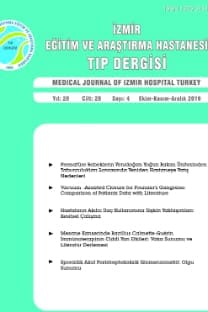HASTALARIN ANESTEZİ, ANESTEZİST VE GÖREVLERİ HAKKINDAKİ BİLGİ DÜZEYLERİ: ANKET ÇALIŞMASI
Hastanemizdeki hastaların anestezi, anesteziye yönelik endişeleri, anestezist ve görevleri hakkındaki bilgilerini saptamak amacıyla 200 hastaya 20 sorudan oluşan anket uygulandı. Ankete katılanların %34’ü anestezinin ne olduğunu, %24.5’i anestezistin kim olduğunu biliyordu. %41.9’u anestezistlerin doktor olduğunu bilmiyordu. Operasyon sırasında bir problem olduğunda bunu tedavi eden kişilerin anestezist olduğunu bilenlerin oranı %10 idi. Ameliyathane dışında anestezistlerin uyutmak dışında başka bir görevi olduğunu bilenlerin oranı %19.6 idi. Vital fonksiyonların takibini anestezistlerin yaptığını bilenlerin oranı %13.7 idi. Sonuç olarak, hastalarımızın anestezi, anestezist ve görevleri hakkında yeterli bilgiye sahip olmadığı saptanmıştır
Anahtar Kelimeler:
Anestezi, anestezi hekimi, anket
PATIENTS’ KNOWLEDGE OF ANESTHESIA AND THE ROLE OF ANESTHESIST: A SURVEY OF QUESTIONNAIRE
A questionare with 20 questions was administered to 200 patients in our hospital to ascertain the patients’ concerns and knowledge of anesthesia and anesthesist. 34% answered the definition of anesthesia, 24.5 % knew who is an anesthesiologist. 41.9% did not think that an anesthesist was a qualified doctor. The answer to the question ‘’Who is responsible for the treatment of an intraoperative adverse event’’ was the anesthesist with only 10%. Only 19.6% could mention any duties that anesthesiologists might have outside the operating theatre. 10% recognised the central role played by anesthetists in the monitoring of the vital signs throughout an operation. It is concluded that our patients’ knowledge of anesthesia and anesthesist is very limited
Keywords:
Anesthesia, anesthetist, questionnaire,
___
- Zvara DA, Nelson Jm, Broker RF, et al. The importance of the postoperative anesthetic visit: do repeated visits improve patient satisfaction or physician recognition? Anesth Analg. 83(4): 793-7, 1996.
- Chew ST, Tan T, Tan SS, Ip-Yam Pc. A survey of patients’knowledge of anaesthesia and perioperative care. Sigapore Med J. 39(9): 399-402,1998.
- Kameyama K, Sakaki S, Tsuda H, Kano T. Citizen’s understanding of anesthesia from a questionnaire survey. Masui. (abstract) 52(4): 412-6, 2003.
- Irwin MG, Funk Sk, Tivey S. Patients’ knowledge of and attitudes towards anesthesia and anaesthetists in Hong Kong. Hong Kong Med J. (abstract) 4(1): 16-22, 1998.
- Swinhoe Cf, Croves ER. Patients’ knowledge of anaesthetic practice and the role of anaesthetists. Anaesthesia. 49(2): 165-6, 1994
- Shevde K, Panagopoulos G. A survey of 800 patients’ knowledge attitudes, and concerns regarding anesthesia. Anesth Analg. 73(2): 190-8, 1991.
- Şekerci S, Akpek E, Göktuğ A ve ark. Hasta ve yakınları ile toplumun farklı kesimlerinin anestezi ve uygulamaları konusundaki bilgi ve davranışları. Anestezi Dergisi. 9(1): 48-51, 2001.
- ISSN: 1305-5151
- Başlangıç: 1995
- Yayıncı: İzmir Bozyaka Eğitim ve Araştırma Hastanesi
Sayıdaki Diğer Makaleler
Ayşen KIZILYAR, Salih SADIK, Muzaffer SANCI, Çiğdem İSPAHİ, Ebru ŞAHİN, M Fatih YÜZBAŞIOĞLU, Gülçin Uğurel AYDAR
ANİ İŞİTME KAYIPLARI VE SONUÇLARIMIZ
Ejder CİĞER, M Doğan ÖZKUL, İbrahim ÇUKUROVA
BATIN İÇİNDE YAYGIN KİST HİDATİKLİ BİR OLGU
NADİR BİR AKUT BATIN SEBEBİ: ABDOMİNAL KOZA OLGU SUNUMU
Fatih YÜZBAŞIOĞLU, Hasan SAYHAN, Ahmet AYKAS, Nazif ALTINER, Önder BİRGİ
Yağ Greft İle MİRİNGOPLASTİ, Fat Plug MYRINGOPLASTY
HASTALARIN ANESTEZİ, ANESTEZİST VE GÖREVLERİ HAKKINDAKİ BİLGİ DÜZEYLERİ: ANKET ÇALIŞMASI
KOLOSTOMİ KAPATMA KOMPLİKASYONLARI
Fatih YÜZBAŞIOĞLU, Hasan SAYHAN, Tufan ÇOLAK, N Nazif ALTINER, Arif Karagöz Hüsnü GÜRSU
